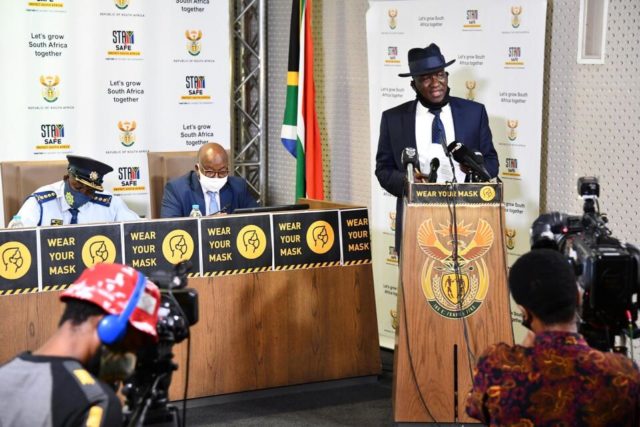According to an expert report, the police who were present at Marikana relied on tactical units armed with R5 rifles and there was a lack of discipline and poor police communication.
AT THE release of a panel of experts report, Minister of Police Bheki Cele said incidents such as the 2012 killings of 34 striking miners in Marikana should never happen again.
The report provided recommendations on policing and crowd control and management within the South African Police Service (SAPS).
In April 2016, the panel was set up under the late Judge David Sakelene Vusumuzi Ntshangase in line with the recommendations of the Marikana Commission of Inquiry. The commission was established by former president Jacob Zuma and it was chaired by retired Judge Ian Farlam after police killed striking mineworkers at the Lonmin mine in Marikana on August 16, 2012.
Prior to the incident, 10 others were killed during a clash between the police and armed miners striking over a wage dispute on August 13, 2012. Among the dead were two security guards and two police officers.
According to the report, the police who were present at Marikana relied on tactical units armed with R5 rifles and there was a lack of discipline and poor police communication.
The aim of the panel was to provide recommendations to assist the SAPS to become more professional, promote public safety and uphold the rights of all people in South Africa.
The panel made 136 recommendations using their terms of reference. This included strategy and policy, public order policing processes and procedures, professionalisation and demilitarisation of the police and accountability and transparency in all SAPS operations.
The panel recommended the prohibition of the R5 rifle and other weapons capable of automatic fire in crowd management and that it should be formalised in regulations issued by the minister of police. Also, such prohibition should apply to other units that may be deployed in support of the Public Order Police for crowd management purposes.
It said the SAPS and its members should accept that they have a duty of public accountability and truth-telling and in operations where there was a high likelihood of the use of force, the plan should include the provision of adequate and speedy first aid to those who were injured. The report said specialist firearm officers should receive additional training in the basic first aid skills needed to deal with gunshot wounds.
Cele said that while it took time to release the report, they wanted to assure South Africans that accountability was in motion.
He said the majority of the recommendations would be realised in the short to medium term as they are incorporated into the South African Police Service Act Amendment Bill.
“This bill has gone through a round of public comments and these inputs are being finalised before tabling the bill in Parliament. The bill gives the assurance that no automatic rifles may be used in crowd control management. It will also address matters of vetting and integrity testing for those employed under the SAPS act, including municipal police.”
Cele said about R598 million was spent to ensure the POP units were better resourced.
“Units were equipped with tools of the trade such as two–way radios, loud hailers, video cameras and PA systems for ease of communication during operations. A total of 6,324 officers have been trained through numerous courses and found competent in proper crowd management.
“Officers in this unit have also been trained on the use of specialised equipment within the public order policing environment, including the use of water cannons and stun grenades. All POP officers have been trained in first aid and each vehicle used for the unit’s operations are equipped with first aid kits as per the expert panel’s recommendations.”
Cele said another recommendation was to encourage the video recording of protests, public unrest and other mass gatherings by the police.
He said the use of rubber bullets as a means of crowd control management was being urgently looked into by the relevant structures.
Cele said it was worrying that protests were often turning violent and dangerous.
“Communities resort to violent demonstrations if and when they feel their voices are not heard when their basic needs are not met. I am making a call on municipalities and other stakeholders to become far more proactive in removing the root causes leading to violent protests.
“Let me also take this opportunity to remind South Africans that the Constitution guarantees that everyone has the right to assemble peacefully and unarmed. Communities are encouraged to act responsibly and within the law when exercising their democratic right of protest.”
Gareth Newham, the head of the Justice and Violence Prevention programme at the Institute for Security Studies (ISS), said the report was released at an important time following a long decline in policing and public safety.
“The ISS welcomes an expert report on policing that notes the constitutional right to peaceful protest and says automatic weapons should never be used for crowd management.
“The panel called for a professional, demilitarised and accountable police service led by experienced, competent, honest and credible leadership and for a system of crowd management that respects the constitutional right to freedom of assembly.”
Newham, who also served on the panel, said the report found that most protests in South Africa were peaceful.
“Peaceful protesters should not be deprived of their right to protest by the violent conduct of others. The potential for violence should be minimised through negotiation and de-escalation measures. Police should avoid indiscriminate use of force, and where force is necessary, it should be targeted only against those involved in violence. The report presents a significant opportunity to start a process that re-imagines and renews policing in South Africa.”
The Police and Prisons Civil Rights Union and the South African Police Union did not comment at the time of publication.








